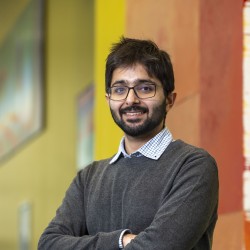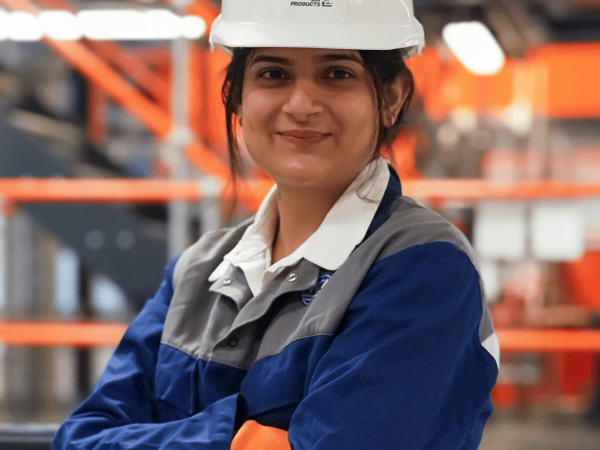
Gul H.
"Choosing to pursue my PhD at the University of Surrey was a natural and straightforward decision. Having already experienced the University's exceptional support and opportunities during my MSc studies...I was excited to continue my academic journey here."
Please give a brief synopsis of your research project
Process systems optimisation has never been more critical than it is today. The need for decarbonisation and economic growth demands innovative approaches to process systems modelling, optimisation and simulation. Despite significant advancements in large-scale optimisations, integrating complex simulations within equation-oriented optimisation frameworks remains a formidable challenge.
My PhD work tries to solve this challenge by developing cutting-edge algorithms that combine the concepts from optimisation theory (such as nonlinear programming and derivative-free optimisation) and surrogate modelling techniques (rooted in mathematics and machine learning).
"This interdisciplinary project spans chemical and process systems engineering, computer science, mathematics, and sustainability. The outcomes of the project will be of significant interest to industry, governments and academia, contributing to the global efforts in emission reduction and improve the efficiency of industrial processes."
The developed framework will provide a new paradigm for process synthesis and enable the design and optimisation of large-scale, complex process systems with reduced computational effort, cost, and emissions.
Why did you choose to study at Surrey for your PhD?
Choosing to pursue my PhD at the University of Surrey was a natural and straightforward decision. Having already experienced the University's exceptional support and opportunities during my MSc studies—such as working as a research assistant in energy lab, engaging in an optimisation-based design project, developing life-long networks, and involving in project management and intrapreneurial activities through IKEEP programme—I was excited to continue my academic journey here.
"Surrey's unique environment is a haven for engineering students passionate about research and innovation in optimisation, sustainability, computer science, space and telecommunications. The University's strong ties with industry, government and other institutions, coupled with its vibrant start-up culture fostered by initiatives like the Surrey Research Park, PhD Accelerator Programme, and Student Enterprise Programme, create an ideal setting for ground-breaking work."
The University's dedication to sustainability, exemplified by initiatives such as the Institute for Sustainability and community projects like Zero Carbon Guildford, resonated deeply with my research interests. My aspiration to engage with these transformative and impactful platforms was a significant factor in my decision to stay at Surrey.
Surrey's impressive student satisfaction rates (which I have experienced), reflect its commitment to providing an enriching student experience.
The rich history of Guildford, once home to faces like Alan Turing (you all have watched the Imitation Game movie) and Lewis Carroll (how can we forget “Alice's Adventures in Wonderland” from our childhoods?), adds a layer of inspiration to my decision of staying at surrey.
"Guildford's status as one of the safest and most economically prosperous towns in England, with a knowledge-based economy, offers an enriching environment. I am immensely proud to be part of the Surrey community and look forward to contributing to its legacy of excellence."
Why are you passionate about your area of research?
My passion for process systems optimisation and sustainability is deeply rooted in a desire to address the pressing challenges of our time (such as climate change, poverty and inflation). I believe that my work will make Earth greener and better—not just for us but for generations to come. I aspire to push the boundaries of science and technology, becoming an expert/technocrat in sustainable processes that help both global economies and the environment thrive.
Have you had opportunities to collaborate with others during your PhD?
During my PhD, I've actively sought and embraced collaboration opportunities, significantly enhancing my research, leadership development and overall student experience.
Attending the EPSRC Network+ Heating and Cooling Summer School early in my PhD allowed me to connect with fellow early career researchers across the UK, fostering valuable relationships within the research community.
Working with Dr Melis Duyar, I synthesised and tested catalysts for the reverse water-gas shift reaction, establishing connections within the catalysis community at both the University of Surrey and the University of Seville-CSIC in Spain.
"My £70,000 grant from the FCDO, UK, and Research England for my energy planning proposal enabled me to collaborate with distinguished professors and their research groups from the University of Nottingham Malaysia, De La Salle University, and Swinburne University of Technology Sarawak Campus. I organised and hosted decarbonisation workshops in Kuala Lumpur, Manila and Guildford, while also engaging with policymakers and industry leaders. During my ASEAN visit, I had the privilege of delivering keynote and seminar lectures in Manila and Kuching."
I also attended the ESCAPE34-PSE24 conference in Italy, where I networked with prominent figures in computational chemical and process systems engineering. I am currently collaborating on a hydrogen production project with partners in the UK and Brazil.
Through my ongoing involvement in the global Student Energy organisation, including founding the Student Energy Chapter at the University of Surrey, and participating in events like the PGR Festival and the doctoral college conference, I am further developing my interpersonal skills and engaging with diverse stakeholders.
My journey has been one of continuous collaboration and growth, and I remain committed to making a positive impact as a researcher and leader in the computational chemical engineering and the energy sector.
What support have you had?
Throughout my doctoral journey at Surrey, I have received support from the university’s dedicated teams.
My primary supervisor, Dr Michael Short, has been a source of inspiration, providing opportunities for both academic and personal growth. I am also grateful to my other supervisors, Prof Tao Chen and Dr Antonio del Rio Chanona, and Dr Melis Duyar, my former line manager, as well as my colleagues across the university.
Financial support from the university, the FCDO, UK, and Research England has been vital in advancing my research. Additionally, the Institute for Sustainability and the Institute of Advanced Studies (IAS) have provided valuable resources for my key initiatives.
The Doctoral College has been fundamental to my PhD journey, offering comprehensive workshops and facilitating every aspect of my doctorate. The University's administrative teams, particularly Finance and IT, have also been highly supportive, providing essential assistance for an international PGR student engaged in computational research.
A standout experience was participating in the IKEEP training and placement organised by the Student Enterprise team, which fostered innovative thinking and practical skills. Moreover, the Global Graduate Award (GGA) courses have been a delightful addition to my learning journey; I am currently undertaking my second course and aspire to complete a third before concluding my PhD.
"The support system at Surrey extends beyond academics. The Students’ Union, Religious Life and Belief Centre, and the Centre for Wellbeing have significantly enhanced my student experience, contributing to both my productivity and overall well-being."
Whenever I seek a change of environment, I benefit from the university’s many common spaces, including the Cafes, Hive, Nest, Dot, and the library. The collaborative ecosystem at the University of Surrey has been integral to my growth as a researcher and individual, and I am grateful to be part of this vibrant community.
What do you plan to do once you've finished your PhD?
After completing my PhD, I plan to continue my involvement with youth-led organisations focused on a sustainable future and join an R&D consultancy or energy firm to promote environmentally conscious fossil fuel extraction and utilisation by enhancing efficiency, reducing pollution, and integrating renewable energy into the energy sector.
With these experiences, I aim to establish my own energy-related company dedicated to encouraging eco-friendly energy production and providing technical support for low-cost, sustainable energy systems. I also intend to give back to my educational institutes, the places where I studied, my home country, and both developing and developed regions that can benefit from my skills.
"Ultimately, I aspire to work with governments to develop effective energy policies and collaborate with global energy forums to create sustainable practices/policies that benefit both current and future generations, contributing to a cleaner and more sustainable energy landscape."


